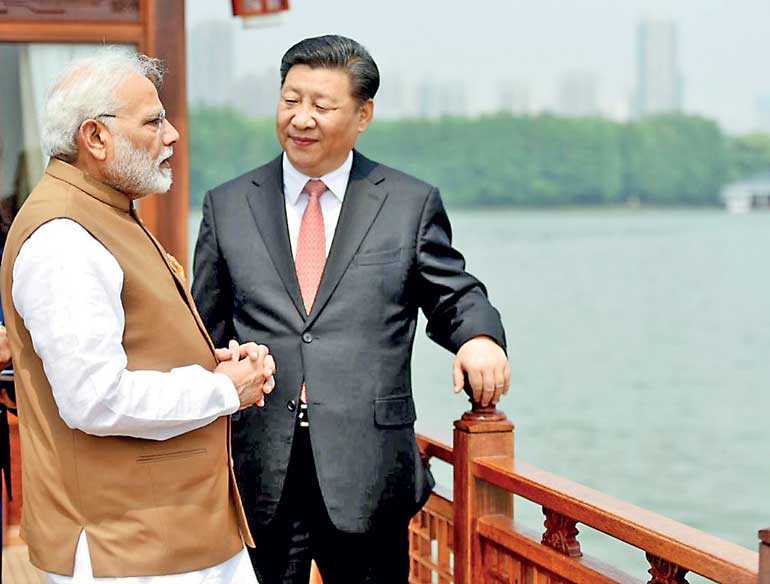Wednesday Feb 18, 2026
Wednesday Feb 18, 2026
Tuesday, 1 May 2018 00:00 - - {{hitsCtrl.values.hits}}
 India's Prime Minister Narendra Modi speaks with Chinese President Xi Jinping as they take a boat ride on the East Lake in Wuhan, China, April 28, 2018 - REUTERS
India's Prime Minister Narendra Modi speaks with Chinese President Xi Jinping as they take a boat ride on the East Lake in Wuhan, China, April 28, 2018 - REUTERS
WUHAN, China (Reuters): The leaders of China and India agreed to open a new chapter in their relationship on Saturday after an informal summit, just months after a dispute over a stretch of their high-altitude Himalayan border rekindled fears of war.
Indian Prime Minister Narendra Modi spent around 24 hours in the central Chinese city of Wuhan for meetings with President Xi Jinping, an ice-breaking trip both hoped would allow candour and nurture trust.
Billed as an informal get-together rather than a summit, the two men held talks on Friday that lasted far longer than expected, and on Saturday chatted over tea on a boat trip round a scenic lake.
“President Xi stressed that the issues between China and India are of a limited, temporary nature but the relationship between the two countries is extensive and ongoing,” Chinese Vice Foreign Minister Kong Xuanyou told reporters in Wuhan.
Their differences are significant: as well as disputes over stretches of a 3,500 km (2,200 miles) border – the two fought a brief border war in 1962 – the Asian giants have squabbled over Xi’s signature Belt and Road infrastructure initiative.
India signalled as recently as Tuesday its opposition to the grand trade and transport plan because one of its branches runs through Pakistani-administered Kashmir, which India claims.
Xi and Modi agreed their problems would be resolved with time.
China’s Foreign Ministry, in a separate statement, cited Xi as telling Modi their nations were major drivers of world economic growth and a good relationship would be positive for global stability. Indian Foreign Secretary Vijay Gokhale said both leaders had agreed they could handle their differences peacefully.
“On the issue of the India-China boundary question, the two leaders endorsed the work of the special representatives in their efforts to find a fair, reasonable and mutually acceptable settlement,” he said.
“And the two leaders also underscored that in the meantime it is important to maintain peace and tranquillity in all areas of the India-China border region,” Gokhale said. Kong said Modi and Xi did not discuss last summer’s border flare-up, although they agreed to seek a fair, reasonable and mutually acceptable settlement to the boundary problem.
“The biggest takeaway was that we have to increase mutual trust,” he said. “The reason that we had this dispute was because we were both mistrustful of each other.” Chinese state media praised the tone of the trip.
The overseas edition of the ruling Communist Party’s official People’s Daily said in a front page commentary on Saturday “two great countries ought to have great co-operation”. It published a large photo of the two leaders shaking hands.
The official China Daily said in an editorial there was no denying mutual suspicion was keeping the two countries from working together.
“Yet neither Beijing nor New Delhi calls the other an enemy, which means both expect bilateral ties to improve. Indeed, China and India are natural partners,” it said.
Despite the upbeat statements, which on Friday included Modi inviting Xi to India for a similar informal summit next year, there were no concrete agreements reached.
Still, Kong said there are a number of projects China and India can cooperate on in the spirit of Belt and Road.
“We won’t force them to do something they don’t want to do,” he said.
India has long been apprehensive about China’s traditionally close ties with Pakistan.
For its part, China has been concerned about US efforts to draw India into a maritime “quad” of democracies, including Japan and Australia.